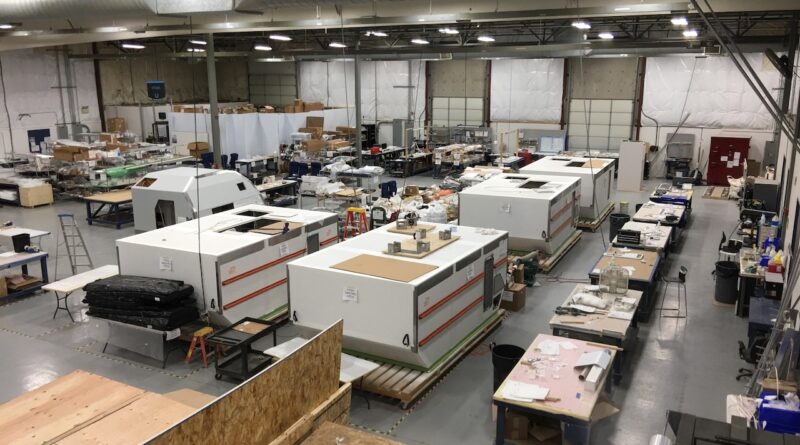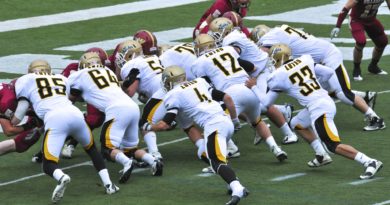Revisiting Failure
I hate looking back on negative outcomes. I want to examine it, learn from it, then leave it and move on. In my mind, nothing can be gained from dwelling on past mistakes and misfortunes. Moving forward, experiencing the best life has to offer, that’s what I want. You have to put your mind to it to do that. So, writing this as a revisit to a huge past failure is neither fun nor easy.
Our Retribution post is getting a lot of reads. There is much to be learned from the misfortunes, mistakes and experiences encountered while building and operating TTF Aerospace, and then participating in its downfall. Essentially, I am chronicling how a perfect storm of corporate egos and operational misfortunes sabotaged a successful business.
As a former owner and founder of the company, that is particularly difficult to do. It’s one thing to detail the strategies and tactics that contributed to the company’s demise, but another thing entirely to look objectively at the why’s and how’s and to assess responsibility. I have my own views and I know they differ from my former partners. I believe I’m the one who worked the hardest to save it. Yet, I was also the one who lobbied to hire the person who ultimately led the company to its failure.
Complicating the telling, this story is long and extremely convoluted. It’s difficult for me to separate what is truly pertinent to the story while maintaining the drama and essence of the challenges and events that hastened its sad and final death. There’s a 389 page fourth draft manuscript filed on my computer. It needs a bit more editing and re-writing to make it the compelling read I’m after, while still imparting the lessons to be gleaned from it. And I hate working on it. Too many emotions, too much investment, too much retrospect about what I should have done differently – who I should not have listened to, who lied to me, and ultimately, could I have done anything about the level of deceit and deception that was employed by others. Questions without answers, only a reawakening of terrible what-ifs and an irretrievable sense of loss. Time I can’t get back. So why torture myself? Because I think it’s a story that needs to be told from an inside, personal perspective. Sometimes subjective storytelling makes impending disaster easier to recognize. That’s one reason for doing it….
On the evening of Friday, October 20th, 2017, I was alone in the dark. Sitting on a black leather sectional staring at nothing in particular, I contemplated the last 24-hours and the somber realizations that had come to light over the past couple of days. What were we going to do? How was I going to come up with the money? I had already been tapped out by the Airbus initiative Phil had insisted we embark upon. Too bad he had so completely mismanaged it.
It wasn’t easy to comprehend the betrayal of a business partner I had known for thirty years. Anger and shock alternately played out games in my head, trying to envision how we were going to overcome this incredible turn of events. We were going to need a series of minor miracles to avoid bankruptcy and keep the Feds from shutting us down and sending the three of us to the slammer. Why had I started this business again?
It was a day of reckoning over why and how Phil, our own incarnation of Bernie Madoff, had managed to so completely manipulate Brad, our Strategic M&A consultant, our management team and me. It made me harken back to the beginning when Brad and I had founded TTF and what our goals were. Over twelve years we had managed to build this company from nothing into 130 employees in our own 70,000 square foot manufacturing plant. From the start, we had emphasized something different in our design/build niche of airplane manufacturing: a team-focused, integrity-driven culture delivering high quality, innovative, reasonably priced interior components to our airline customers. Consistency to those points was far from normal in the airplane retrofit business, and it was working.
Phil, at my insistence, had come from a much larger company, Aviation Technical Services in Everett. I had brought him in to emphasize a heightened discipline to software-controlled manufacturing and financials; something our current management team had been unable to master. The first two years of his tenure had good results. Then the Airbus initiative came along and suddenly he had careened wildly off the tracks. That brought me to this moment, wondering how it had gone so wrong, why I had ever started this business, and most of all, what was going to happen now. What was the way forward?
After the Elite debacle described in Retribution was past us, we were simply fighting for survival. It became what I would eventually call a perfect storm of corporate egos, supplier disasters, and customers with too much influence and too little comprehension.
That kind of ego unavoidably works against trust. I certainly misplaced mine, but I’ve learned there will always be someone, somewhere, sometime who will betray me. I’m not foolproof; my intuition, assertiveness and sense of fair play will only spare me from some of them. I recognized some of these people were only takers, only concerned about themselves. I learned narcissistic sociopaths (is that a double negative?) could be extremely sophisticated in how they manipulate people, and they become ruthless when they feel threatened. At the time, I knew I had to be prepared to be nasty. In the end, just fighting fire with fire wasn’t enough.
Despite all that, to me trust still means everything in business, in personal relationships, in life. To whom I give it is always a risk – always. So I need to remain open-minded yet vigilant, kind yet assertive, receptive to change yet disciplined and process driven. And I need to communicate. Too much trust is like too much power – it corrupts those upon whom it’s bestowed. It unintentionally creates an environment where there’s no such thing as an action requiring permission or disclosure. We were duped into letting Phil go there, although it also became apparent that’s exactly where he had intended to travel. TTF was to be his crowning glory, his biggest ego boost and his greatest cash prize. All that was tangled up and wrapped together in his head, and he found it impossible to separate them. Looking back it was not particularly hard to see.
All those warnings aside, becoming a victim of trusting too little would also never have gotten us anywhere. And that, for me, is probably the greatest conundrum of life. Sometimes I pick correctly and sometimes wrongly. It’s the way we are and life is. When things don’t work out probably the hardest part is accepting I’ve been fooled. When I open myself to people, to giving others chances, to testing my beliefs, I’m bound to experience great successes, challenges and failures. Accepting that has helped weather the bitterness and revenge that has wanted to overtake me. I don’t consider negative feelings of failure, anger and denial, sense of loss, even envy, to be worth the price they exact from our health or state of mind. So I try to let go of the need to exact retribution. Instead, I focus on negotiating a peace. It will never give me all I want or feel I deserve, but it helps minimize the loss while maximizing the gain for as little human and monetary cost as possible, especially my own. Focusing on all the other stuff will prevent me from moving forward, from enjoying what’s still good about life – achieving goals, finding new experiences and sharing time with good people. They’re still out there; I need to be open to them.
Through all this, trying to practice what I preach by keeping an eye on the good stuff while dealing with a negotiation process and the distinct possibility of some very bad outcomes wasn’t easy.
Matea is a good example of misplaced trust. The dedication Matea had expressed a few weeks before was suddenly erased when she gave notice and bolted to another interiors company. Being a controlling-type, she apparently couldn’t handle the uncertainty of our situation. She later told me she had been pursued by AIM Aerospace. Others reportedly said she met with a recruiter in the Elite booth while representing TTF at an Aircraft Interiors convention in LA. Either way, I knew then the words she spoke to me only seven weeks before were just window dressing. I spoke to her at the company Christmas party. She apologized, saying she knew she had made a promise but it was an offer she couldn’t refuse. She offered to continue helping TTF with work. I could see the guilt in her eyes, but I wasn’t interested.
I had been hopeful she was stronger than that, but I can’t say I was completely surprised. Complete loyalty and dedication are rare commodities. She’s from that mold of people who want to play the part but don’t have the mental stamina to do so. They are everywhere, and TTF had its share. They are the kind seduced by the glory of advancement and power and driven by intractable self-assurance. Their weakness is dealing with and delegating to others – it typically overwhelms their low degree of trust. They go into panic mode, leap to erroneous conclusions and micro-manage themselves into a frenzy – and down the rabbit hole they go.
After a while most of them become relatively easy to spot. Matea was one of those who talked a good game and had the brains and the skillset to play at the top. In the end, however, playing at that height exposed her real mortal weaknesses – patience and humility. It was interesting she appeared to possess a sincere empathy, but the commitment to it was short-lived. It’s easy to be empathetic when nothing is required. But our situation wasn’t like the rest of the world, where truths and commitments are all relative to the level of difficulty – we needed follow-through from everyone. We would see Matea again. This wasn’t going to be the only time she would show her true colors.
I think very few understand the level of commitment and strategic sophistication, particularly in a complex industry like aerospace, required to play this game. A belief in others is requisite and yet, as represented here, always a risk. Disappointments abound, lurking in people everywhere you look. It’s enough to make all but the staunchest become bitter, cease to believe in people and fall to cynicism. It sometimes takes an almost irrational faith in human goodness, dedication and loyalty to keep moving ahead. How does one develop a jaundiced eye while still promoting human goodness? I think it partly revolves around encouraging the patience to learn the right way, through experience. There’s no substitute for it.
I’ve come to realize leaders and brainiacs who exercise humility are probably the rarest and most valuable commodities on earth.
There were plenty of mistakes that came after the Elite offer to purchase was discredited and dried up. To my mind, our MIT Sloan School of Management educated consultant, Doug, made most of them. The worst thing he did was invite our customers into the building. It’s one thing to give them an office and visibility to their project, it’s quite another to allow them to manage their project. Essentially, that’s what Doug did.
I told him why it was a bad idea – aerospace is cutthroat. You don’t allow customers, who know nothing about being an after-market aircraft retrofitter, to run the store. It’s like asking a mortician to run an assisted living center – he’ll end up thinking it’s more profitable to kill them off instead of keeping them alive. With Delta Air Lines and TAP, that’s exactly what happened.
Each one wanted to monopolize resources rather than share them. We were constantly fighting. They were supposed to be freeing up resources and opening supply chains. Instead, we were the ones fighting to facilitate while the airlines stood in the background threatening everyone. It doesn’t make for a cooperative environment when customers try to bully the very people they need to bail them out. Delta just felt it could get whatever it wanted with threats, like an 800-lb gorilla swinging wildly in all directions; that plan never works.
Doug, with his MIT education that made him all-knowing, ignored me and let the foxes in the henhouse anyway. Here was a guy whose ego was as big as the building. And he was horrible at managing and motivating people. With no empathy and little ability to relate to people with different lifestyles, I was constantly repairing relationships with employees he had offended. On top of all that were the supply chain issues.
Thanks to our previous President’s reckless lack of mitigation planning, this all began with fighting cash flow issues. Still, production continued to build momentum despite one roadblock after another. Ultimately, we may have been undone by a series of unheard-of catastrophic supplier failures.
One of our extrusion suppliers lost their aerospace certification; with another extruder we saw lead times increase from 3 to 16 weeks, sparking a panic of activity to design and qualify new material and find new extrusion mills. We developed four parallel path solutions and searched all over North America and as far as Russia to see which would bear fruit first. Due to the Trump-induced trade wars we saw lead times on aluminum alloys (for our extrusions), lighting and signage components double or triple, and had air flow sensor supplies vanish.
The extrusions had been painstakingly approved through an Airbus qualification program. Now our only option was to re-design those extrusions with another alloy and re-qualify them all over again. A complete structural analysis would have to be written and submitted for Airbus to pick over.
Once we thought we had the structural extrusion problem handled our structural adhesive supplier had a plant explosion that shut down production. Worse, they didn’t bother to tell us; we only found out when our orders were late. With that, bonding of the major composite assemblies and modules was on hold. Now we were scouring the earth again looking for structural adhesive.
After that, our second composites manufacturer had a fire at their plant, shutting down production of our composite panels. We had gone through all that time and expense to Airbus-qualify their products only to hear their factory blew up. This was a perfect storm no one could have anticipated.
We had vendors break promises, hold parts hostage for advance payments, and never perform to agreed production rates. We engaged the purchasing might of our customers to help push delivery dates forward. These crew rest projects just seemed to be throwing one impossible situation after another at us. And yet, through it all, the collective tenacity of everyone at TTF was somehow still pushing us forward.
The end came when no investor was willing to take on a turnaround project and customers lost their patience. Even though we were still delivering product, everyone we saw was only interested in a profitable, turn-key operation. All the tens of millions of dollars of IP, product lines and customer relationships didn’t matter. Suddenly, a company with its largest order and dollar backlog ever (over $53 million and climbing) was of no interest. Delta left with two nearly finished million dollar crew rests sitting on the shop floor.
That’s a drop in the bucket of what really happened. You’ll have to wait for the book to learn the rest.




